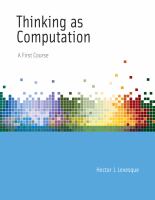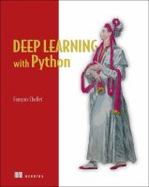AI/ML Syllabus
Instructor
Dr. John Zelle
Office: SC 353
phone: (319) 352-8360
e-mail:
john.zelle@wartburg.edu
Office Hours
MTWHF 10:30--11:30 (Weds. via Zoom only)
Class Format / Meeting Times / Location
Class meetings are scheduled for MWF 12:00 in SC 247.
Due to the pandemic, class is being offered in a hybrid in-class/Zoom format. You are expected to attend every regular class session either physically or via Zoom. The class will be divided into two groups. One group will be in the classroom on Mondays, and the other will be in the classroom on Fridays. Wednesday sessions will be virtual (all on Zoom).
Class WWW Page
http://mcsp.wartburg.edu/zelle/cs373
This page has links to class resources and will be updated regularly with all assignments and announcements as class progresses. This is your bookmarkable, mobile-friendly, one-stop shop to keep on top of everything that is happening in class.
Course Description
Artificial Intelligence is a broad and increasingly important application area of computer science. The ultimate goal of research in this field is the construction of more intelligent and generally useful computer systems. It would be impossible to do justice to the all of the various subfields of AI in a one semester course. In this course, we will "triangulate" to give a flavor of the breadth and depth of AI work by first considering the foundational principles and techniques of traditional, symbolic AI, followed by a look at practical, modern, deep learning techniques. The class will be project-based, giving students first-hand experience in the implementation of (somewhat) intelligent programs. Some of the more ambitious projects will involve teamwork.
Course Prerequisites
CS 220 and access to an Internet connected personal computer running Windows, MacOS, or Linux.
Credit Hour Policy
This class is 1 course credit. You may expect to spend at least two hours of time outside of class, completing reading, study guides, and programming assignments, for every scheduled hour of class time.
Student Learning Outcomes
A student successfully completing this class will:
- Understand the many facets of artificial intelligence (AI) as a field of study.
- Be familiar with the foundational techniques and algorithms that underlie modern AI including: problem representation, search, knowledge and reasoning, machine learning, and neural networks.
- Be able to design, implement, and evaluate solutions to simple AI problems.
Textbooks

|
Levesque, Hector, Thinking as Computation, (MIT Press, 2017). ISBN: 978-0262534741
Required. We will be following the textbook very closely. You MUST have the book in order to successfully do the required work. We'll call this one "TaC." |

|
François Chollet Deep Learning with Python, (Manning Publications, 2017). ISBN: 978-1617294433
Required. We will be following the textbook very closely. You MUST have the book in order to successfully do the required work. We'll call this one "DLP." |
Course Outline
- Unit 1
- Introduction
- Thinking as Computation
- Back-chaining
- Introduction to Prolog
- Constraint Satisfaction
- Exam 1 (9/21)
- Unit 2
- Prolog Lists
- Natural Language Understanding
- Planning
- Game Playing
- Exam 2 (10/28)
- Unit 3
- Introduction to Machine Learning
- Mathematics of Neural Networks
- Neural Classification and Regression
- Overfitting Avoidance
- Exam 3 (11/2)
- Unit 4
- Convolutional Networks
- Computer Vision
- Recurrent Networks
- Natural Language Processing
- Exam 4 (11/23)
- Final Project (Due: 12/3)
Evaluation
| Exams (4) | 60% |
| Projects | 30% |
| Homework/In-class work | 10% |
There will be 3 exams (see schedule above). The first two exams cover the material in units 1 and 2 respectively, and each is worth 20% of your grade. The final exam is comprehensive and is worth 25%.
Some homework will be assigned virutally every class day and is generally due at the beginning of the next class. Homework is mainly graded on "effort," rather than correctness. The day's homework may or may not be collected at the discretion of the instructor. Also included in the homework score are in-class activities such as groupwork and programming labs that, again, may be collected/graded or not, at the discretion of the instructor.
Programming projects differ from homework and labs in that they will mostly be graded for correctness and style. Projects will have varied deadlines, but you will always have at least until the next class period to complete them. We will have between 4 and 8 projects over the semester.
Grading Scale
Grades are assigned based on the (weighted) percentage of total points:
- 90-99 A
- 80-89 B
- 70-79 C
- 60-69 D
- Other: Thanks for playing
Pluses and minuses will be used to "smooth" grade transitions. I may move the exact boundaries, but they will not be raised. Anyone with 90% of total points will receive some sort of an "A".
Attendance
Regular attendance is expected. Although not part of the grade per se, excessive absences will certainly affect a student's performance in the class. The instructor will not provide individual tutoring for material missed due to unexcused absences. While recordings of class Zoom sessions will be made available, the points for any in-class work missed due to an unexcused absence will be lost.
Honesty
You are reminded of your obligation to the Wartburg Honor Code which states:
Students, faculty, and staff of Wartburg College are expected to demonstrate integrity in all endeavors. Students are expected to adhere to four essential principles:
- Submit only original work and properly cite ideas of others, including fellow students.
- Refrain from giving or receiving unauthorized aid on examinations and assignments.
- Report any act that violates these principles.
- Ask for clarification if uncertain about the expectations on a particular assignment.
Students are responsible for abiding by these principles and opposing academic dishonesty in all academic endeavors.
Absolutely no cheating will be tolerated. Any situation where I feel there is sufficient evidence of cheating will be vigorously pursued. The minimum penalty is a zero for the assignment. Of course, discussion of ideas is healthy and essential for education. Feel free to discuss approaches to assignments and to help fellow students with problems in their programs. Be sure, however, that the assignments you turn in represent your own effort. There is an importance difference between sharing ideas and wholesale copying. Allowing or assisting someone else to copy/use your work is as bad as copying yourself.
Late Work
Keeping up with study guide and project deadlines is critical to successfully completing the class. Late work will receive only summary grading and can earn a maximum of 75% of the original assignment.
Late Exams
Late exams will be given only under exceptional circumstances. Except for the case of confirmed medical emergency, arrangements must be made prior to the actual exam date.
Face Masks
Face masks or cloth face coverings are required in the classroom at all times. Face masks will also be required outdoors when a physical distance of at least six feet is not reliably possible to maintain. (Source: Campus Health Recovery Team, June 15, 2020)
FERPA and Privacy
In a blended or distance learning environment, the federal law (FERPA) continues to remain in effect, but students should think about their role in supporting the privacy of fellow students. As this course includes remote interactions, be cognizant that shared pictures, written assignments, videos, emails, blog posts, discussion boards, etc. remain part of the content of the course, just as it would if it were shared in the face-to-face classroom setting. While the privacy of those posts cannot be guaranteed, the expectation is that each member of the class treat those materials with care and not reshare or post beyond this course.
Access and Accommodations
It is the policy and practice of Wartburg College to create inclusive and accessible learning environments consistent with federal and state law. If you anticipate or experience academic barriers due to a disability (including physical, mental health, learning, vision or hearing) you may request accommodations by contacting Nicole Willis, Disability and Access Coordinator at (319) 352-8230, or by e-mail nicole.willis@wartburg.edu. The Pathways Center offers resources and coordinates reasonable accommodations for students with disabilities and/or temporary health conditions. Presenting documentation of disability early is helpful and often necessary to secure needed materials in a timely way. Accommodations should be requested prior to affected assignment due dates. Accommodations will not be provided retroactively
Sexual Misconduct and Discrimination
Wartburg College is committed to providing a learning, working, and living environment free from all forms of sexual misconduct including, but not limited to, sex-based harassment, non-consensual sex acts, sexual exploitation, relationship violence, and stalking. Wartburg College considers sex discrimination in all forms to be a serious offense and it will not be tolerated.
The Wartburg College's Title IX, Sexual Misconduct and Discrimination Policy, following national guidance from the Office of Civil Rights, requires that faculty follow Wartburg's policy as a "mandatory reporter" of any personal disclosure of sexual harassment, sexual misconduct, and/or violence related experiences or incidents shared with the faculty member in person, via email, and/or in classroom settings. These disclosures include but are not limited to reports of personal relationship abuse, relational/domestic violence, and stalking. While faculty are often able to help students locate appropriate channels of assistance on campus, disclosure by the student to the faculty member requires that the faculty member inform appropriate Wartburg personnel to help ensure that the student's safety and welfare is being addressed, even if the student requests that the disclosure not be shared.
For confidential counseling support and assistance on campus, please contact:
- Wartburg College Counseling Services, 319-352-8596
- Wartburg College Campus Pastor, 319-352-8217
For private, but not confidential, resources on campus, please contact:
- Director of Campus Security, 319-352-8372
- Karen Thalacker, Title IX Coordinator, 319-504-0468
- Cassie Hales, Director of Residential Life, 319-352-8260
- Dr. Dan Kittle, VP of Student Life, 319-352-8745
- Campus Security officers and residence hall directors
General Caveat
The policies presented here should be taken as general guidelines and are subject to change at the discretion of the instructor with due notice and consideration. "If any point in dispute is not covered by the Rules, the decision shall be made in accordance with equity." (Rule1-4 of USGA Rules of Golf).